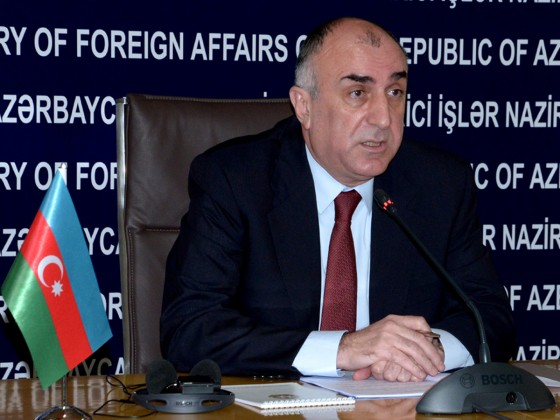
Settlement of the Nagorno-Karabakh conflict must start with immediate, complete and unconditional withdrawal of Armenian forces from Azerbaijani territories, said Azerbaijan’s Foreign Minister Elmar Mammadyarov Dec. 3.
He made the remarks in a statement addressed to the 22nd OSCE Ministerial Council, held in Belgrade, Serbia.
“The protracted conflicts in the OSCE area remain the major threat and challenge to peace and security on the European continent,” Mammadyarov said, noting that no substantive progress has been achieved in the settlement of the Armenia-Azerbaijan conflict since the last meeting of the Ministerial Council in Basel.
“Armenia continues to disregard the calls of the international community, including the presidents of the OSCE Minsk Group co-chair countries to start result-oriented negotiations on a peace agreement,” he said. “The leadership of Armenia imitates the engagement with a view to consolidating the volatile status-quo created through the unlawful use of force and ethnic cleansing.”
The minister said that the so-called “balanced” or undifferentiated attitude to the aggressor and the victim will never produce a desired outcome.
“The policy of appeasement only emboldens the aggressor,” he noted. “As an example, I need to mention the ongoing efforts by Armenia towards consolidating the occupation of the territories of Azerbaijan through implantation of settlers, infrastructure changes, as well as exploitation of and illicit trade in assets, natural resources and other forms of wealth in the occupied territories, in clear violation of international humanitarian and human rights law.”
Mammadyarov said that in this context, it is critical that the OSCE participating states demonstrate a principled position in defending the principles and values that the organization is striving for in order to keep the prospects of political settlement alive.
“The unlawful presence of the armed forces of Armenia in the occupied territories of Azerbaijan is the major destabilizing factor with the potential to escalate at any time with unpredictable consequences,” he stressed.
“The settlement of the conflict must, therefore, start with immediate, complete and unconditional withdrawal of Armenian forces from Azerbaijani territories, as demanded by the UN Security Council resolutions 822 (1993), 853 (1993), 874 (1993) and 884 (1993) and as implied by the mandate of the co-chairmen of the OSCE Minsk Group,” noted Mammadyarov.
He added that putting an end to Armenian aggression against Azerbaijan and withdrawal of Armenia’s troops will be a significant confidence building measure completely changing the dynamics of peace process and opening up immense opportunities for the development of South Caucasus.
“This would pave the way for a safe and dignified return of the forcibly displaced population to their places of origin, normalization of relations and restoration of the communications in the region, as well as for the creation of objective conditions for the Azerbaijani and Armenian communities of the occupied Nagorno-Karabakh region to discuss their joint future within Azerbaijan,” he stressed.
Mammadyarov also said that in this regard, latest ideas proposed by Sergey Lavrov, minister of foreign affairs of Russia, supported by other OSCE Minsk Group co-chairs, can provide a very good impetus to reach a breakthrough in peace talks.
The conflict between the two South Caucasus countries began in 1988 when Armenia made territorial claims against Azerbaijan. As a result of the ensuing war, in 1992 Armenian armed forces occupied 20 percent of Azerbaijan, including the Nagorno-Karabakh region and seven surrounding districts.
The two countries signed a ceasefire agreement in 1994. The co-chairs of the OSCE Minsk Group, Russia, France and the US are currently holding peace negotiations.
Armenia has not yet implemented the UN Security Council’s four resolutions on the liberation of the Nagorno-Karabakh and the surrounding regions.
Trend
